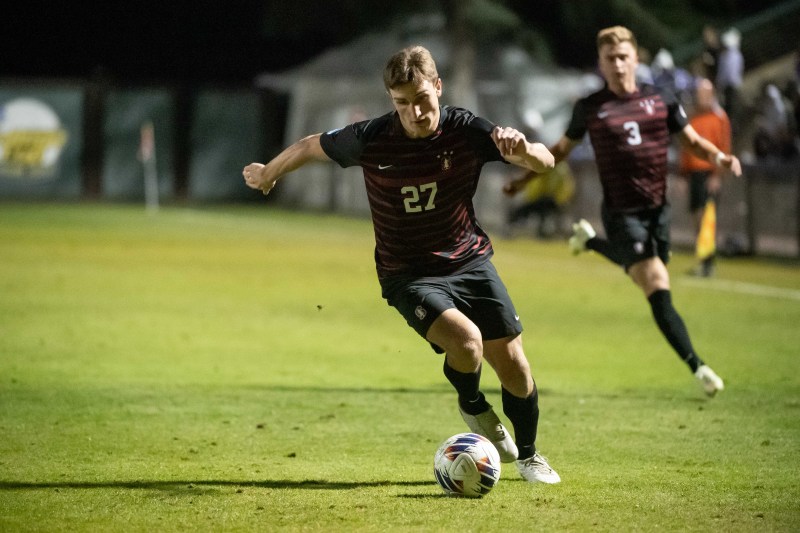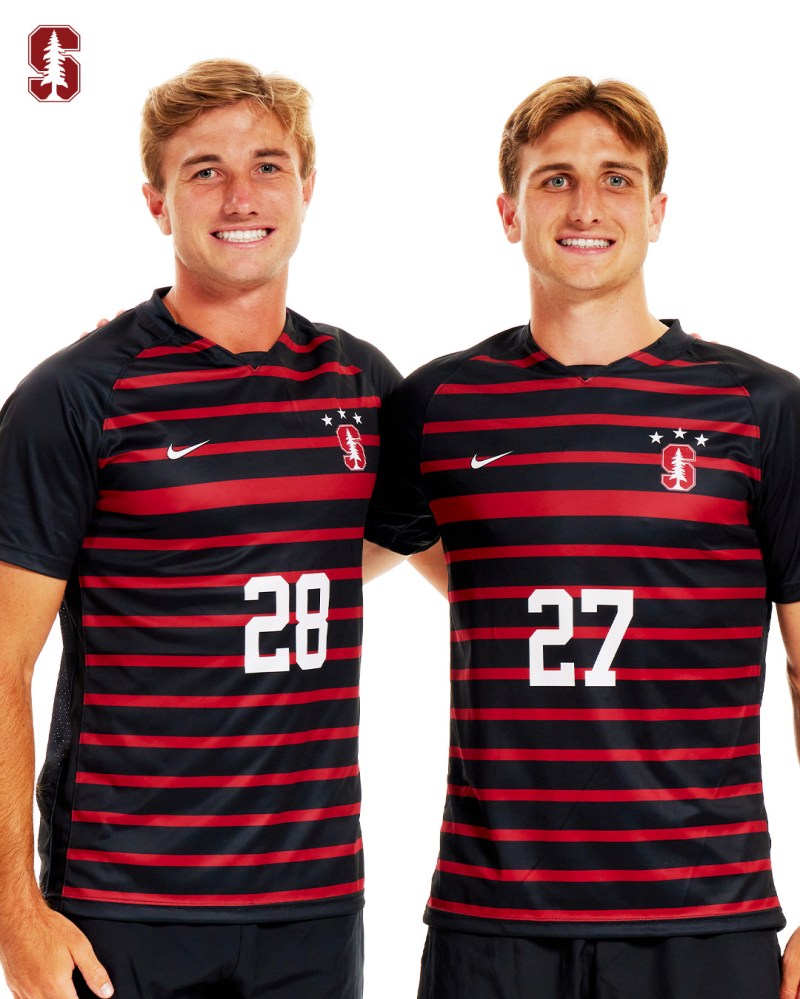Stanford Athletics is no foreign space for twins, especially for twins succeeding in their fields. Stanford was home to the legendary Bryan brothers — Mike and Bob Bryan ‘00— professional tennis players who won 16 Grand Slam men’s doubles titles and 119 ATP titles total. The Cardinal also boasted former basketball players Jason and Jarron Collins ‘01, twin basketball stars who played center and were inducted into the 2017 Stanford Athletics Hall of Fame. More recently in 2021, the Hull twins, Lacie and Lexie Hull ‘22, enjoyed a sensational NCAA championship win with the women’s basketball team.
While the presence of twins on Stanford’s sports teams is not uncommon, it is not exactly frequent, and thus is always exciting to hear about the unique dynamic that comes from navigating athletics in sync. One new leaf in the Stanford book of twin athletes, hailing from southern California, is a set of soccer players, Fletcher and Palmer Bank.
The twins — who are currently finishing up their freshman year — play different positions: Fletcher is a midfielder, while Palmer is a defenseman. As a freshman, Fletcher recorded five assists, the third-most on the team.
The beginning
Growing up in Bakersfield, Calif., Fletcher and Palmer tried several sports before landing on soccer.
“I think we just started playing all sports — our parents were really big on going into all different sports. Our mom was our soccer coach, and we just really liked it,” Fletcher said.
The journey to liking soccer wasn’t the same on both sides, however. Interestingly, for a period of time, one twin was more committed than the other.
“I used to be really into it [soccer] when we were probably 10 or 11. It was hilarious. I used to love playing soccer every day, and then he [Palmer] wouldn’t want to practice,” Fletcher said. “We’d be training, and we’d be having practice and you’d be in the car with our sister just playing around, messing around.”
“Yeah I used to really, really dread it,” Palmer said. “Then it finally just came around. Naturally, it just clicked.”
In fact, before learning to love soccer, Palmer had an affinity for golf. He recalls a specific instance of devastation when there was a conflict between the Club Championship (golf) and State Cup (soccer).
“I thought that I was playing in the Club Championship and then my parents told me like the night before, ‘We’re not going to the Club Championship tomorrow. You’re going to the State Cup,'” Palmer said. “I was devastated. And I was crying. And then I went to the State Cup.”
“Yeah, and I was happy,” Fletcher said. “Because I was like, ‘We needed you back there [on defense].’”
Palmer admits he probably would have stuck with golf or another sport if not for Fletcher. But Fletcher and Palmer did everything together, and soccer became an activity they loved to do in tandem.
After playing for their mother, Natalie, they started to play for other leagues. Soon after, they got another trainer to help the twins take their play to the next level.
“We met this guy when we were like 10 years old. It was a soccer trainer, and that’s really what inspired us to play soccer because he kind of became our coach,” Fletcher said. “We started taking it more seriously from there. And so from 10 all the way up to now, we did play other sports but I think we started to focus more on soccer.”
While their parents gave them the freedom to choose any sport, there was one sport that was off the table, a rule set by their father, Baynes.
“I think my dad liked [soccer] because football is so dangerous. My dad played football in high school and he saw the effects of brain damage and concussions,” Fletcher explained. “And he refereed for like 20 years, just for fun… and he saw so many brain injuries just reffing so he didn’t want us to play football.”
In terms of family dynamics, the twins describe their parents as key to their competitiveness.
“Our mom is very competitive,” Palmer said.
“Our dad is competitive, but he’s more like, ‘As long as you try your hardest, good job.’ Our mom’s like, ‘We gotta win,’” Fletcher added.
In all, this mix from their parents was a good balance, and the brothers had a great time playing soccer from the time they were young.

Going D1 and choosing Stanford
“I think the goal was always to basically play Division I soccer. It’s always been the goal. I think there’s moments when you doubt whether it’s possible… [but] we made it a priority to go to all these like recruiting camps and identification camps,” Palmer said.
The brothers credit their parents for the abundant investments they made into the twins’ training throughout the years, as well as their support in the recruitment process amidst the uncertainties of the COVID-19 pandemic.
“I remember there was a time when I told my parents that I was just gonna give up and I was like, ‘I’ll just go to school academically, like apply to a bunch of schools.’ We had worked so hard, and soccer, it had been our life for eight years, probably maybe 10 years,” Fletcher said. “And my parents were like, ‘No, we’re not gonna let you give this up.’ They almost believed in me when I didn’t even believe in myself.”
As for choosing Stanford, for both brothers, a quality education was as important a factor as the soccer program.
“There were some [Division] II and III schools that were like, highly considered because of the academics. But I think Stanford was our dream school,” Fletcher said. “Like since eighth grade we went to camp here. And then just like fell in love with the team, the program, the campus, the people, like everything.”
The fact that their parents also really liked Stanford sealed the deal for the twins. The Bank brothers love being close to home and family.
Playing on the team together
Although they’ve always been on the same team, the novelty and significance of having each other as teammates has never worn off.
“We can be honest with each other,” Fletcher said. “Especially at a D1 program, it can be really difficult sometimes and it can be stressful. It’s a lot mentally and physically. You need someone there to talk to you and be honest, and you can honestly do that with other teammates, but it’s different when it’s your brother. When you have your brother there, it’s like unconditional love.”
Being teammates for so long, the brothers have found that being around one another makes them stronger players and people.
“My favorite thing about my brother is the fact that he makes me a better person. He holds me to a high standard. I feel like that’s been throughout my entire life,” Palmer said.
Fletcher, meanwhile, says that he appreciates Palmer’s honesty.
“I feel like you’re always there for me in that honest voice, like the back of my head, like when I’m stressed overthinking something, and I’ll talk to you about it and it doesn’t become a problem anymore,” Fletcher told his brother. “You’re just always there and super supportive and loving.
When asked if they’re treated differently on the soccer team as siblings, Palmer and Fletcher answered almost simultaneously.
“No,” Palmer said.
“A little bit,” Fletcher said.
“Our teammates like to have fun with us,” Palmer added.
“They think it’s funny because we’re very touchy, we hug a lot and we’re always like arms around each other in the locker room,” Fletcher continued. “So they think it’s funny because it’s in the locker room. Everyone’s supposed to be serious and stuff.”
While Fletcher and Palmer appreciate each other, there’s often competition between siblings, and one has to wonder, amidst this tight camaraderie, if there’s ever an edge. This resonates sometimes for Palmer, who notes that “everything’s a competition.”
But Fletcher has never seen it as competition.
“If I lost to my brother, that’s the greatest joy because I’m losing to someone in my family. Like if I see him play well, and I don’t play well, I’m still really proud of him and what he’s done,” Fletcher said.
Both agree that playing different positions greatly reduces the level of competition, especially because of the complementary nature of the midfield and defender positions which requires them to work together to achieve success.
Personal life
Other than their parents, Palmer and Fletcher credited their Christian faith as a source of inspiration.
“A lot of the times I put so much energy into soccer, and in school, and I really need to, like you said, shift your perspective to what really matters the most in your life,” Palmer said. “And so I think that’s really what Christianity has done for me.”
Echoing the ideas of his twin brother, Fletcher explained the impact that Christianity has had on him.
“But I feel like if you have this outlook of your identity in Christ, it doesn’t even really matter like whether I’m a starter or not,” Fletcher said. “I can still have an impact on the people around me.”
Fletcher and Palmer are not only talented in soccer, but in other endeavors as well.
When asked about his hidden talents, Palmer said, “Probably like the fact that I’m a scratch golfer, [and] I can walk on my hands.”
“I like to play guitar, it’s like a hobby,” Fletcher added.
“We both like guitar,” Palmer said. “[But he’s] a lot better.”
The twins, along with Stanford men’s soccer, will return to the field this fall for another season playing on the same side.
